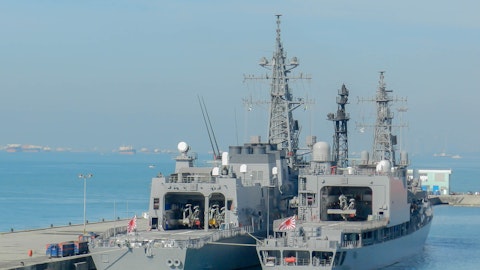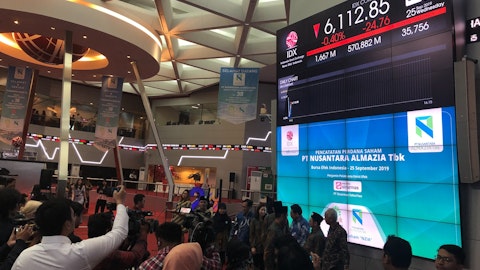Jay Malave: Yes. So as I mentioned in my prepared remarks, we’ve got about — we had orders of about $1.5 billion. We’ll start delivering on some of that in 2023, and that will carry over into 2024. We’ve got a line of sight to significantly more orders beyond that, that we’ll see again in the outer years. And so it’s still to be determined. But what I can say is that we have had contract funding and internally funded projects to make sure we can meet higher ramp rates, whether it’s HIMARS, GMLRS, PAC-3, all of those, all are opportunities from where we are today and part of the investment that our customer is making and that we are making to drive the higher ramp rates.
Jim Taiclet: Yes. And Matt, it’s Jim. One of the issues that this situation has illuminated with is that when you need to accelerate production in the defense enterprise for national defense, we would have liked to have been able to A, ramp up the production faster and B, bringing the revenue sooner. So it just highlights the need, I think, and it’s an urgent one, to work together with government and industry to quickly evolve the relationship between the two so that we can maintain an effective deterrent conflict as we’ve talked about. So what I’m discussing with some of our senior government officials who are receptive, and there are several thought leaders in government on this now, is apply the concept of anti-fragility to the relationship between government and industry, meaning things like ensure that we have multiple reliable sources of key materials and components, right?
So we have a lot of single-source components that we have to go back down into our supply chain and find out who and if they can double or triple their production of the components so we can double or triple the output of the system. Another piece of this anti-fragility concept is to have the government invest in production capacity with us, call it, 2 standard deviations above the mean peace time production rates. So if you need to accelerate, you can quickly and start up the line or speed up the line much faster. Another one is significant, expansion of the use of long-term and multiyear contracts so that we don’t have to have a fluctuation in demand year-to-year, which sets our supply base back, again, less willing to invest because they can’t predict the future.
And then finally, especially for those small and medium businesses, we’re suggesting that government really take an overview of a broad overview of the oversight and compliance burdens that are on companies that participate in the defense industrial base from an audit and compliance and certified cost perspective, truth and negotiation act, things like that, while we at Lockheed Martin and other major defense funds would like to see that burden ease, it’s a burden that can really prohibit other medium and small companies from working with us or working with the government to provide what it needs. So there’s a great dialogue beginning. I’m sure other companies are raising these issues too. But this issue of restocking raised an important industry issue that we’re going to try to work with government to solve.





